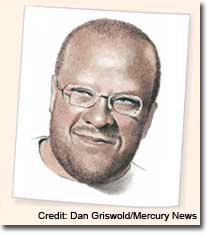February 01, 2006
Good Work, Great Journalism
 The terrific series of stories by the San Jose Mercury News about inequities in the local criminal justice system is being held up by Dan Gillmor and others as an example of the type of serious, civic-minded work a big newspaper can do, a type of journalism that is threatened by newsroom budget cuts and the willingness of corporate boards to sacrifice quality to satisfy shareholder interest.
The terrific series of stories by the San Jose Mercury News about inequities in the local criminal justice system is being held up by Dan Gillmor and others as an example of the type of serious, civic-minded work a big newspaper can do, a type of journalism that is threatened by newsroom budget cuts and the willingness of corporate boards to sacrifice quality to satisfy shareholder interest.
The San Jose Business Journal, in an editorial, made the point most clearly (emphasis added)
"That's a lot of work to sell for 50 cents a copy. … It's exactly the kind of work that would vanish if one follows the logic Knight Ridder is advancing to potential buyers as they kick the tires on the 32-paper chain. Knight Ridder confirms telling bidders they could save $150 million a year by cutting staff, paper and newshole -- i.e. cheapening the product. …"At the end of the day, we get what we pay for, whether it's information or highways.
"In our haste to cut taxes and get 'free' information, we as a society have lost touch with reality and in the end we'll pay the price. Buying generic works for acetaminophen and paper towels, but all information isn't the same. And that's a lesson San Jose and 31 other markets around the country are on the verge of learning the hard way."
Exactly correct. Generic journalism is junk journalism. What little value it once had has been lost from commoditization. Newspapers must learn a hard lesson: The everyday, routine grist that fills the white space today isn't worth much to readers and the significant effort needed to produce that type of news doesn't produce much of a return for the newspaper.
What is valuable now, and I believe will become even more valuable in the future is focused, specialized, localized journalistic work - whether done by mainline investigative reporters like Rick Tulsky of the Mercury News or, at the other end of the spectrum, by hyperlocal web journalists like Deborah Galant of Barista.net. These are two very different breeds of journalism, but their commonality is in their uniqueness. Tulsky's work on "Tainted Trials, Stolen Justice" won't be replicated anytime soon by a competitor; Galant's reporting on her Northern New Jersey community has the singularity of her personality.
That's the first lesson from the Mercury News series: Be Unique.
There is another: Print and Web can supplement each other, not displace.
The online presentation of the series suffers some of the weaknesses that always occur in the translation from print to pixels. Big graphics that must have looked great in the paper, are scrunched into PDFs and have to be scrolled to be read (unless you've got a monster monitor).
But, the online package contains terrific informational elements not possible to create in print such as this analysis of 261 criminal cases or a beautifully illustrated and narrated presentation of the entire series with video interviews (no link because of pop-up, but go to main series page and multimedia.)
I would have liked to see even more of the latter - more voices from the victims, more video. Powerful stories become even more compelling the more human we can make them.
Dan Gillmor is right: "We need great journalism, and we especially need the kind of work this series represents."
And, we need to create economic models to support it.
![]() UPDATE: Craig Newmark says "professional journalism is a big deal." He writes:
UPDATE: Craig Newmark says "professional journalism is a big deal." He writes:
"Looks like I can't say this enough, since it's forgotten in both the excitement for citizen journalism and the stress of competition. Professional journalism involves high standards of writing, fact checking, editing, and research."
More here on his blog.
Tags: Journalism, Newspapers, Media
Posted by Tim Porter at February 1, 2006 07:02 AMAnd where is the work being done to create these economic models? Because honestly, I don't see such effort in the industry for the most part.
Posted by: Lex on February 1, 2006 08:22 AM